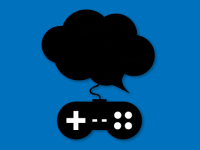Controlling the Power of Words: Teaching Students How to Confront Insults
Instead of surrendering their power to the person who insults them, students should learn why some words are triggers and how to master their own reactions.
When I was about six years old, I called my older brother a slew of four-letter words. My wise grandmother took me aside and told me, "There are no bad words, but some words make other people feel bad. The words you just used are OK to say if you are all alone, but never with other people." The obvious point she made was that it's wrong to hurt others. This was consistent with the way I was raised, although I never was and am not always able to live up to this important value.
In fact, it took me 50 years to fully understand the real meaning of what she was saying. Her most important lesson was how much power we give to words. This power leads to control. Words have no power on their own. It's the emotional connection we attribute to certain words that allow them to heal, express love, or infuriate us. Many words are so strong in their power that people lose jobs and are even killed because of them.
Words with this kind of power typically involve anti-Semitism, racism, religious defamation, sexual orientation, or cultural attacks. Children in school have additional words that can invite a violent reaction, including making fun of the way people look, a comment about family members (especially mothers), disabilities, gang affiliation, or dress. Most teachers have to deal with both insults and their aftermath on a regular basis. Fighting is one of the most serious social problems facing schools today.
I know three effective ways to reduce the power of insults to children. I developed these from what I learned from my grandmother those many years ago. The principle is to reduce the emotional connection from the words. If we take away the power of those words, they can no longer control us. Children and adults have incredible difficulty in learning how to do this, but it can change our lives in a most powerful way: we stop allowing others to control our behavior.
My co-author Allen Mendler and I have taught teachers the following three sets of skills. Many teachers have told me that they didn't believe these techniques had any chance of working with their students. Later, the same teachers told me that after trying them, these ideas worked much better than expected. I hope you're willing to give them a chance. You have nothing to lose.
1. Substitute a New Mental Image
This technique works best with younger students. Have them think of all the words that hurt their feelings. Make a master list. Then teach them to imagine the person saying these mean words in a clown outfit, or with bananas sticking out of their ears. You can use any image that looks ridiculous. Alternately, teach them to hear "your mother" as "your banana." It takes weeks of practice, but kids can learn to replace hateful emotions with silly ones, ones that elicit laugher. This might not work with all of your students, but it will work with many, especially if you take the time to practice.
2. Understand Why a Student Wants to Insult You
With older students, Al Mendler suggests writing two questions on the board:
- What are some things that other students can say or do to you that really make you angry? (The most common answer given is "your mama.")
- Why do they say or do these things?
Discussion of this second question includes further questions like:
- Are they saying this because they're interested in how your mother is doing?
- Are they saying these things because they want you to be happy?
- Are they trying to help you?
Eventually, the students -- even the toughest ones -- conclude that these things are said or done to make you feel bad, to hurt you. Then, each student needs to think of what to say or do to show that they refuse to be hurt and will not respond. Students typically develop responses to aggression with statements like:
- I'd like to punch you in the face, but you're not worth it.
- It takes no courage to insult me, but I'll show you real courage by ignoring you.
- I must have done something really bad to you to make you say these things. Maybe later when I'm not so angry, we can figure out what it is.
3. Understand the Power You Give to Your Tormentor
By responding to taunts with violence, we surrender power over our own feelings and actions. To help your students understand this surrender, discuss the following questions:
- If somebody says something hurtful to you, do you have a right to be angry?
- If you get angry and respond violently, do you think you are actually doing what your tormentor wants you to do? Doesn't he hope that you'll get angry enough to feel bad?
- If someone wants to make you angry, and you do get angry, who is in control of your feelings?
- Do you want to be controlled by someone who wants to hurt you?
- If you have a right to be angry but want to be in control of how you act, what can you do?
These activities are all designed to teach students that words have the power to hurt only if they let them. We all have many choices about how to take control in hostile situations. The best of these choices require practice and reminders if we want them to work effectively.
How do you help your students deal with insulting language?
